2500+
Successful Projects

As we look into the future of mobile app development, trends and predictions reveal exciting new opportunities for app developers and businesses alike. The ever-so-fast technological advancements have led to a significant shift towards more advanced and interactive user experiences. The future trends and predictions in mobile app development are set to revolutionize the way we use our gadgets now.
Table of Contents
In our previous blogs, we introduced you to several emerging technologies and trends, but now it’s time to explore the predictions around them. For instance, what could we expect from these technologies, and how will they help streamline the development process?
This blog post will help you gain insights into the latest trends and predictions in mobile app development. It will focus on five key areas that we think will be responsible for this change: AI & ML, AR/VR, Cloud Computing, IoT, and Security and privacy. By having a robust understanding of these key trends, businesses can gain a competitive advantage by developing one-of-a-kind apps tailored to meet users' ever-evolving demands.

Let’s start this guide to the future trends and predictions in mobile app development to better understand what the future holds for this dynamic industry. But before that, here are some insightful statistics that will surprise you:
As it is clear how technology has made its way into mobile app development, let’s take a look at the future predictions to understand better what we should expect from these emerging technologies in this sector.
If we look at future technology trends in 2024 and beyond, artificial intelligence (AI) and machine learning (ML) are poised to influence the landscape of mobile app development and m-commerce significantly.
These technologies are set to revolutionize business solutions, with app developers leading the charge. As a result, there will be more advanced AI-integrated applications that enhance user engagement, streamline business processes, and fuel growth.
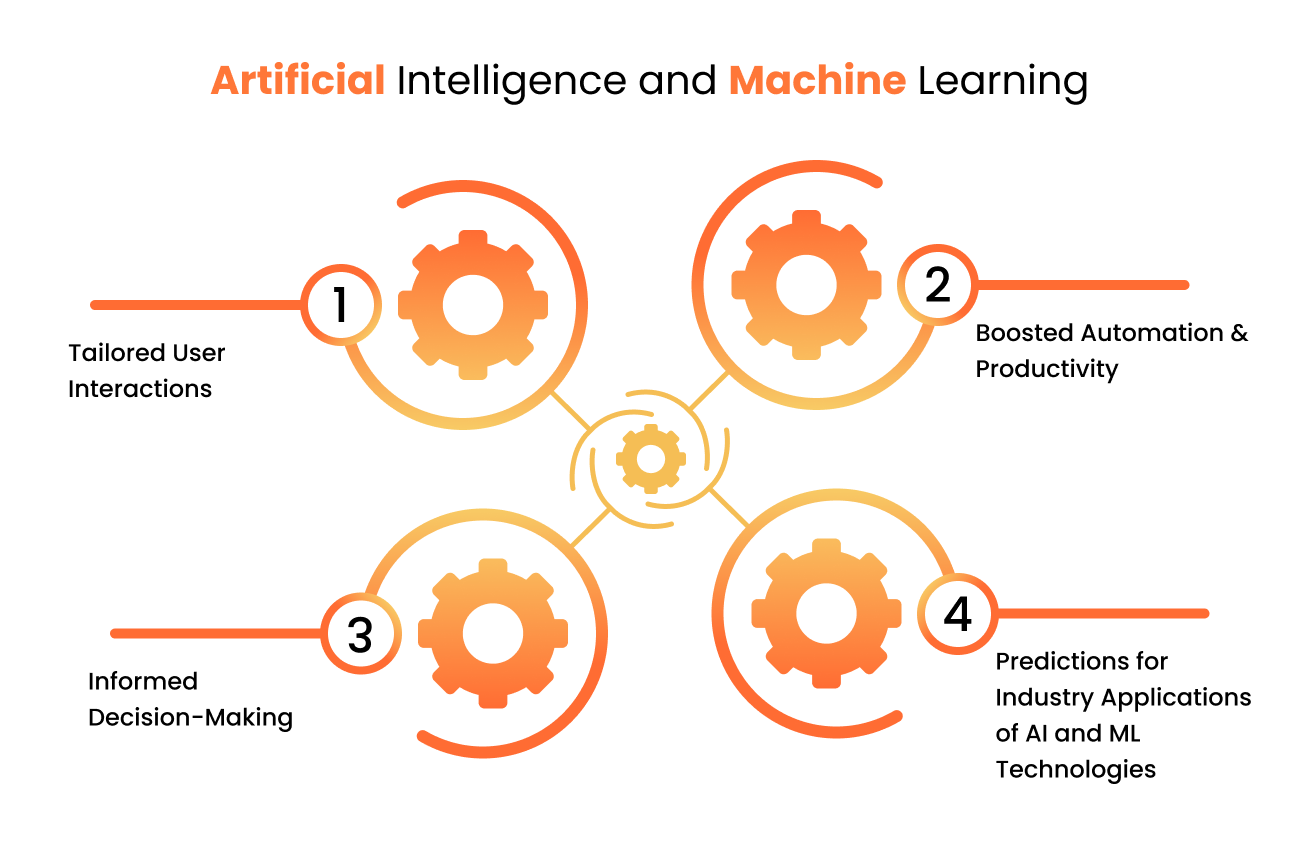
Here are the future trends of AI and ML in mobile app development:
By incorporating AI and ML into mobile applications, developers can offer highly customized experiences that adapt to each user's unique preferences and behaviors. These technologies facilitate real-time personalization, identifying patterns through machine learning algorithms that analyze extensive data gathered from user-app interactions.
The integration of AI in mobile apps enables businesses to enhance their processes through automation. This reduces the need for manual tasks and boosts efficiency across various operations, such as customer service or inventory management, using intelligent chatbots or predictive analytics tools.
AI and ML models offer valuable insights to decision-makers, providing accurate forecasts of market trends or consumer behavior patterns. This data-driven approach leads to more effective strategic planning and business success.
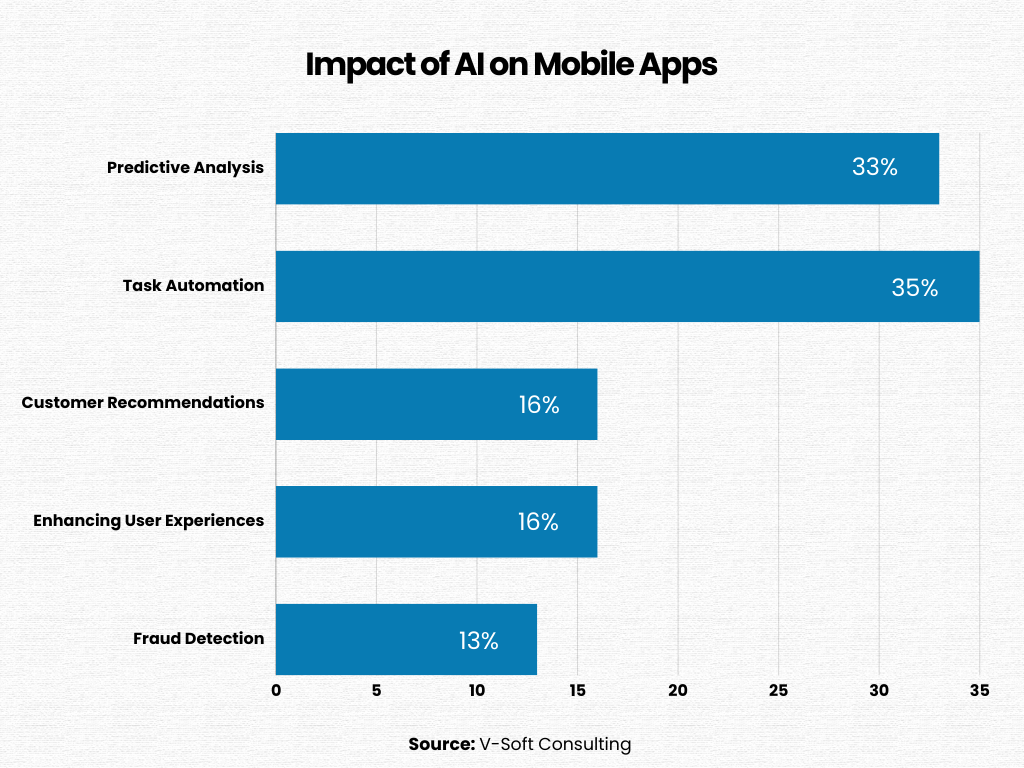
Augmented Reality (AR) and Virtual Reality (VR) aren’t the newest trends in mobile app development. We have already experienced these technologies in mobile apps through Pokemon Go. However, AR/VR technologies are rapidly evolving and proving to be innovative solutions for a wide range of businesses.
From virtual training modules to immersive onboarding experiences, AR/VR technologies are increasingly becoming the go-to choice for many businesses. According to Statista, the AR/VR market could reach a staggering $52 billion by 2027.
The integration of AR and VR in mobile apps has ushered in a new era of user engagement. These technologies allow users to interact with digital content more engaging and immersively, offering unique experiences previously unattainable on traditional platforms.
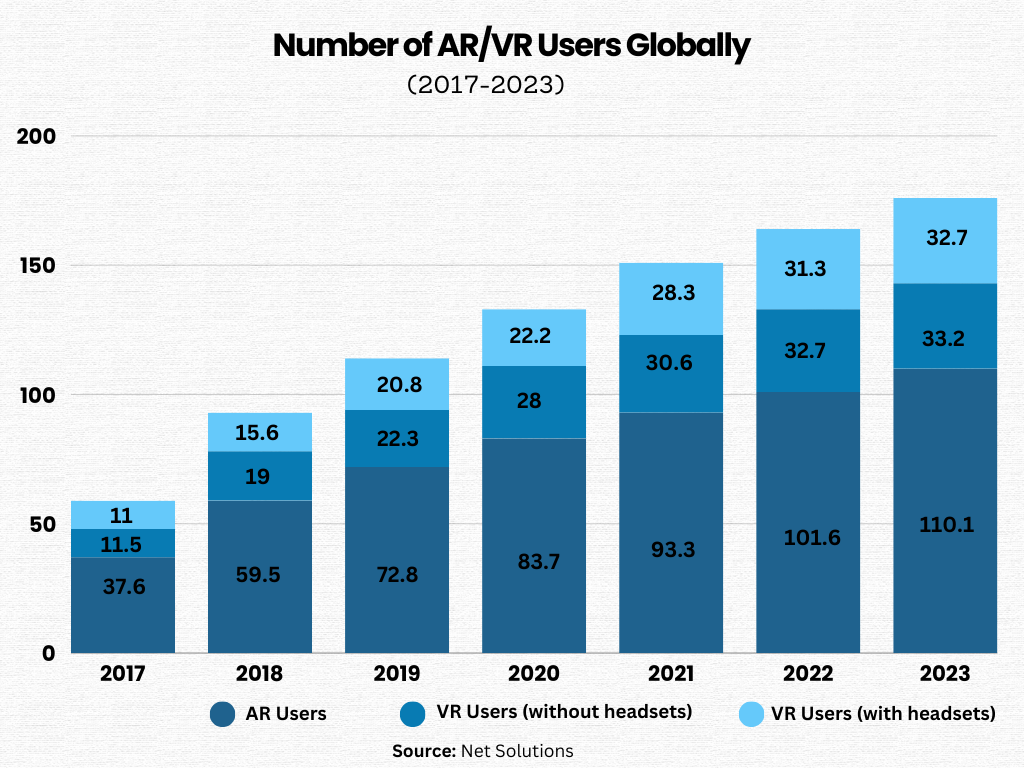
The influence of AR and VR on mobile app development is significant, with more sectors acknowledging their potential for boosting user engagement, increasing sales, and enhancing customer satisfaction. As AR and VR continue to evolve, they could bring about transformative changes in mobile app development.
Cloud computing is set to become a breakthrough technology in mobile app development, with numerous development companies offering robust cloud solutions for businesses of all scales.
As cloud technology's advantages become more evident, it's crucial for mobile app developers to stay abreast of the latest trends to deliver innovative and efficient apps.
Looking forward to 2024 and beyond, several cloud computing trends are set to influence the future of mobile app development:
Cloud computing will persist as a key element of mobile app development, offering numerous advantages such as scalability, data security, cross-platform compatibility, and simplified maintenance and updates.
As the Internet of Things (IoT) continues to weave its web, connecting devices and objects globally, mobile applications are becoming the backbone of this technology that unlocks its vast potential for businesses across various sectors.
Here are some of the key benefits of IoT-enabled mobile apps:

A key feature of IoT-enabled mobile apps is their ability to blend smart devices into our daily routines seamlessly. Custom-built apps enable users to manage their IoT devices directly from their smartphones, such as intelligent thermostats, lighting systems, or surveillance cameras. This integration not only elevates the user experience but also allows businesses to automate previously manual tasks, enhancing operational efficiency.
IoT-enabled apps have a wealth of data from connected devices, offering invaluable insights for businesses when analyzed effectively.
At Mtoag Technologies, we excel in integrating sophisticated analytics tools into mobile apps, empowering businesses to make data-driven decisions based on real-time information sourced from various channels, including sensors, wearable tech, and social media platforms.
In the current digital landscape, where Android and iOS hold significant market shares, developers must design apps that are compatible across both platforms without sacrificing performance or user experience.
With the increasing transmission of sensitive data between IoT-connected devices via cloud services, implementing robust security measures during app development has never been more critical. Modern mobile app developers utilize state-of-the-art encryption methods and adhere to best practices to protect user data from potential threats and breaches.
As IoT continues to reshape industries globally, mobile app developers must stay ahead of the curve by keeping up with the latest trends and technologies. The transformative power of IoT promises to enhance our lives and significantly revolutionize numerous sectors, including e-commerce, healthcare, and education.
In the era of the digital revolution, safeguarding privacy and security is more important than ever for businesses and consumers. The advent of technologies such as blockchain provides secure solutions that shield user data from harmful entities as mobile app development continues to advance.
Here are the future trends for integrating security and privacy in mobile app development:
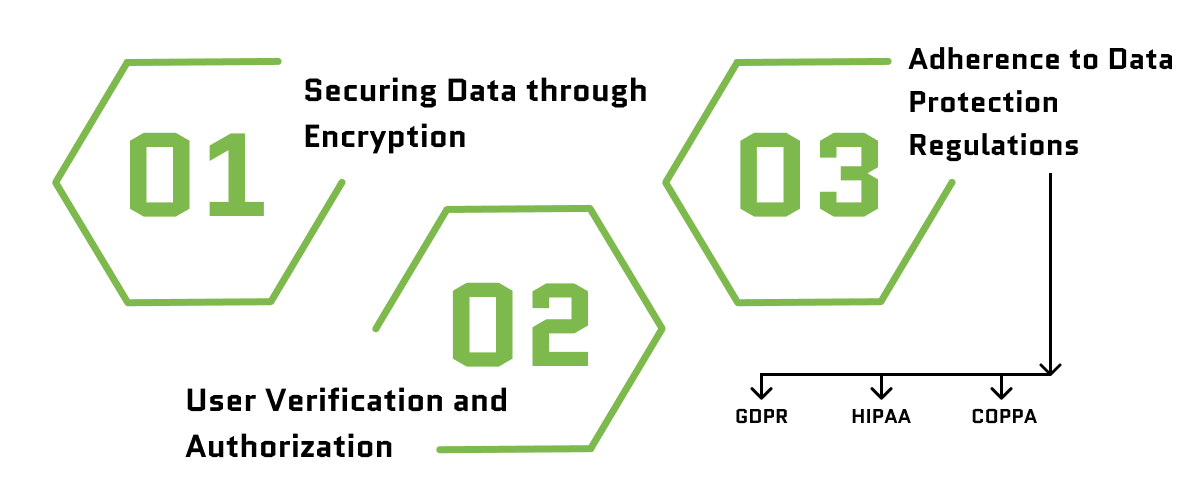
Development firms employ sophisticated data encryption methods to guarantee top-notch security in their applications. Potent algorithms like AES-256 or RSA-2048 safeguard sensitive data, ensuring its safety even if it falls into the wrong hands. This guarantees the protection of your business's precious data during transmission between devices or when stored on servers.
Another vital component of mobile app security is the establishment of sturdy user verification and authorization systems. The incorporation of various verification and authorization procedures, such as MFA, biometric identification, SSO, and RBAC, guarantees user data safety in accordance with GDPR.
Low-code or no-code development trends are significant in the mobile application industry. These tools are a boon for developers, offering unique shortcuts that expedite the creation of interactive applications.
Low-code and no-code platforms empower both professionals and developers to swiftly and efficiently build applications within a visually intuitive development environment.

Given these advantages, it's hardly surprising that the worldwide market for low-code platforms is expected to soar to approximately $65 billion by 2027. This trend underscores the growing importance and potential of these development tools in the tech industry.
In 2019, the Samsung Galaxy Fold made its debut as the first foldable smartphone in the US. Motorola launched a foldable version of the RAZR not long after, following the same trend. Apple, while holding several patents related to foldable smartphones, has yet to release a foldable device.
The demand from consumers is driving this trend in mobile app development into 2024 and beyond. According to a report by Statista, global shipments of foldable smartphones are expected to exceed 50 million units this year. This opens up a unique opportunity for app developers and business owners.
With their large screens and multi-window capabilities, Foldable devices offer a new avenue for app optimization. This innovation could shape the future of mobile app development. The same trend is observed in wearable devices, allowing for app customization based on the wearable preferences of the target audience.
The concept of predictive analytics, which uses technologies like machine learning, AI, data mining, and modeling to anticipate events based on data, is a critical player in this field. For instance, Netflix suggests shows to users based on their viewing history. However, as we move into 2025, predictive analytics is expected to become more widespread, focusing on improving the user experience.
The underlying principle is to create a unique, personalized experience for each user within the app. No two users should have the same app experience. This approach aims to make each interaction within the app unique and tailored to the individual user's preferences and behavior.
According to a report by PwC, the on-demand app market is set to skyrocket, with projections indicating it could reach a staggering $335 billion by 2025. This report underscores the significance of on-demand apps, positioning them as the future of app development and emphasizing the continued growth of the on-demand economy.
So, what does this mean for app developers and businesses? You can use on-demand app development to provide a diverse range of features and functionalities that cater to your audience's evolving needs.
Choosing the right app development trend can enhance your business's visibility and accessibility to your target market. Beyond the potential revenue advantages, the mobile app trends mentioned above can boost brand recognition and reach prospective customers, thereby establishing your authority in your niche.
Beacon technology, a leading trend in mobile app development, leverages Bluetooth Low Energy (BLE) devices to provide services based on proximity location. They are small wireless transmitters that have the ability to connect and interact with nearby mobile applications.
A study by Fortune Business Insights predicts a substantial expansion in the global beacon market. The market is projected to reach a value of $31.61 billion by 2026, reflecting a significant compound annual growth rate (CAGR) of 48.9% during the forecast period.
The integration of beacons into mobile applications allows developers to deliver personalized content, notifications, and promotions based on the user's precise location. This technology enhances user engagement, elevates the customer experience, and opens up new avenues for innovative app development across a range of industries.
As we have seen above, the emerging technologies are revolutionizing the app development landscape. However, integrating these technologies into your apps requires careful consideration. Here are some key points to keep in mind:
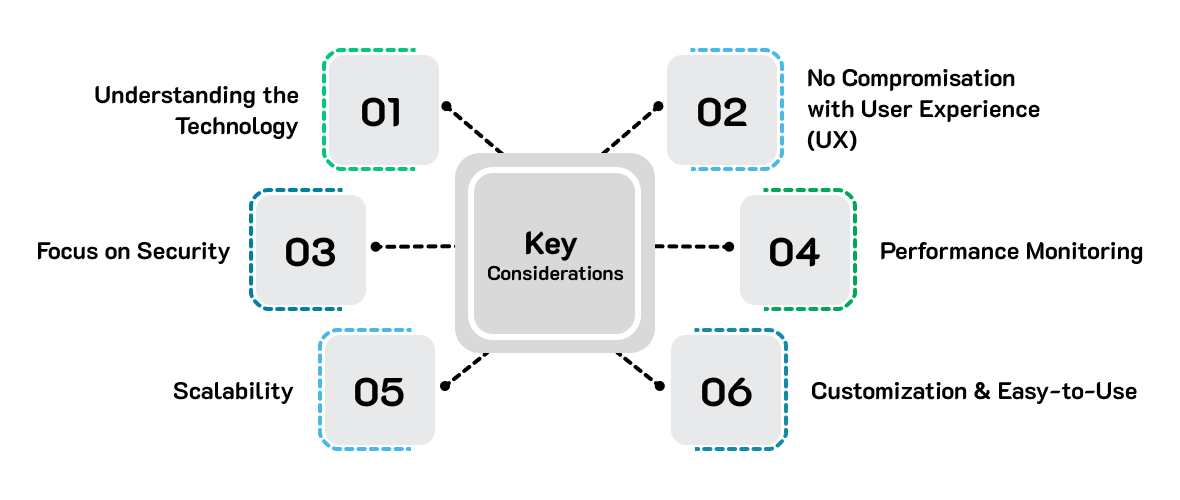
Before integrating any technology into your app, it's crucial to understand it thoroughly. This includes its workings, benefits, limitations, and potential use cases. For instance, Blockchain can enhance security and transparency, but it may not be necessary for a simple content-sharing app.
Implementing new technologies should not compromise the UI/UX of the app. It's important to ensure that the technology integration is seamless and adds value to the user. For example, IoT can provide real-time data, but users might not find it beneficial if it slows down the app or makes it complex.
Emerging technologies often come with new security challenges. When implementing these technologies, you need to consider data privacy, secure transactions, and protection against cyber threats. For instance, Blockchain offers enhanced security but requires robust encryption algorithms.
Regular performance monitoring is essential to ensure that the integration of the new technology does not affect the app's performance. Tools that provide real-time analytics and insights into the app's performance can be very helpful.
The technology you integrate today might become mainstream tomorrow. Therefore, ensuring that your app can scale and adapt to the growing user base and data volume is essential. Scalability is especially important in technologies like AI, where the accuracy improves as the amount of data increases.
Every app has unique requirements. Emerging technology should be customizable to cater to your app's specific needs. For example, the AI algorithm you use for a shopping app would be different from that of a weather forecasting app.
Finally, the technology should be easy to use. This applies not just to the end-users but also to the developers who will be working with the technology.
While emerging technologies offer exciting possibilities, implementing them should be a strategic decision based on a thorough understanding of the technology and careful consideration of the factors mentioned above. Keep in mind that the goal isn’t just to use the latest technology but to create an app that provides value to users.
As we move forward to the future of mobile app development, emerging technologies will be instrumental in shaping the sector's future. By staying abreast of these cutting-edge trends and breakthroughs, developers have the potential to create advanced applications that enhance smartphone users' experiences.
Whether your interest lies in developing applications for on-demand services or gaming platforms, the future promises a plethora of thrilling opportunities. Given the increased rates of mobile usage and the growing acceptance of wearable and smart devices globally, businesses must stay at the forefront of innovation.
The current trends in mobile app development include the rise of 5G technology, integration of the Internet of Things (IoT), use of Augmented Reality (AR) and Virtual Reality (VR), Beacon Technology, Artificial Intelligence (AI) and Machine Learning (ML), and chatbots.
The future is promising with advancements in AI, VR, AR, and blockchain influencing the course of mobile app development. Apps for phones and wearables are taking center stage.
5G technology is transforming the mobile app industry by offering enhanced features at better speeds. It allows access to progressive technologies such as IoT, UltraHD videos, cloud computing, AR & VR.
AI is becoming a fundamental component of mobile apps, enhancing user experiences, boosting app functionality, and enabling personalized recommendations. It's set to play a pivotal role in predictive analytics, chatbots, and voice recognition.